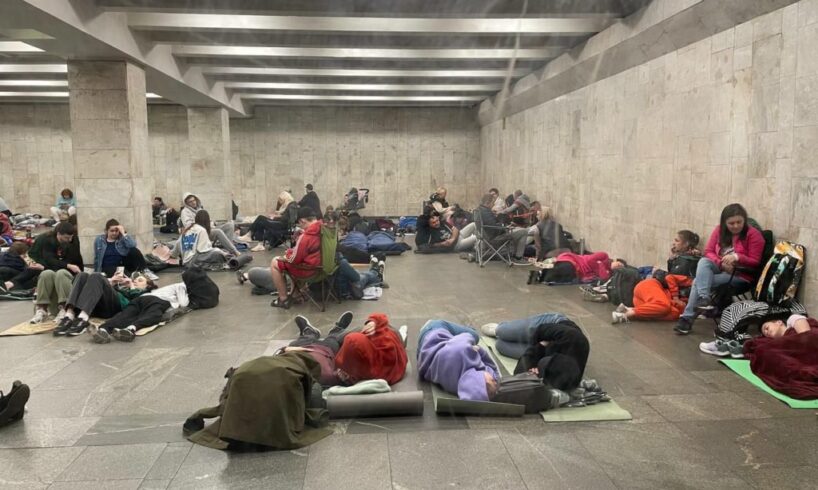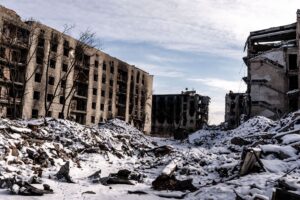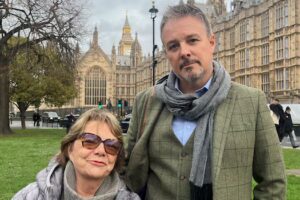
(function(w,q){w[q]=w[q]||[];w[q].push([“_mgc.load”])})(window,”_mgq”);
A scientific study tracking over 100 Ukrainians’ sleep patterns during six months of war has revealed that chronic sleep disorders persist even on quiet nights, with insomnia rates three times higher than in peacetime countries, Texty.org.ua reported on 28 October.
The research, conducted by an international team of scientists with financial support from MSCA4Ukraine and the European Union between October 2023 and March 2024, measured 1,344 nights of sleep deprivation. During the night of 25 November 2023, when over 70 drones attacked Kyiv, half of the study participants from the capital and its surrounding region spent significantly more time awake than usual.
Russian troops has been attacking Ukrainian civilians almost daily since 2022. Ukraine and international institutions classify these attacks as war crimes.
A 53-year-old woman from Kyiv Oblast experienced multiple awakenings that night, spending far more time awake than normal. Her sleep data showed poor rest even on nights without air raid alerts.
“We expected to see a clearer correlation between poor sleep and air raid alerts. However, our expectation was not confirmed,” the researchers stated.
After nearly two years of constant nighttime attacks, Ukrainians developed chronic sleep disorders. Individual data shows poor sleep regardless of the presence or absence of alerts.
During late 2023 and early 2024, when air raids disrupted an average of 6-7 out of 40 nights covered by the study, 44% of participants showed signs of insomnia, while 27% exhibited clinical insomnia. This is three times higher than indicators typical for peaceful countries, where clinical insomnia is diagnosed in only 8.5-13% of the population.
The study documented multiple sleep pattern disruptions. A 50-year-old woman from Dnipropetrovsk Oblast typically went to bed between 21:00 and 01:00, but spent an additional hour or two falling asleep. Her nighttime awakenings were also significantly longer than normal.
An 18-year-old from Kyiv Oblast usually went to bed around 02:00 and woke between 06:00 and 08:00. Despite proportions of sleep phases generally corresponding to norms, on some days she slept only four hours instead of the necessary 7-8.
A 22-year-old Kyiv woman showed the opposite problem. Her sleep quality indicators were generally good, but duration significantly exceeded the norm, sometimes reaching 12 hours.
A 22-year-old Kyiv man often went to bed after dawn between 06:00 and 08:00. Again, overall sleep quality corresponded to norms, but daytime sleep is less beneficial for recovery.
Alongside constant alerts, many study participants developed other psychological problems. The research found depression, anxiety, and post-traumatic stress disorder among participants.
All participants underwent cognitive behavioral therapy for insomnia during the study. Some showed substantial improvements. A 32-year-old Kyiv woman demonstrated noticeable changes in sleep quality indicators between the beginning and end of the observation period.
“Cognitive behavioral therapy for insomnia is effective and capable of improving sleep quality during war,” the study authors showed.
The therapy does not involve any medications and is based on changing behavior and attitudes toward sleep.
Anton Kurapov, a lecturer at the Faculty of Psychology at Taras Shevchenko National University of Kyiv and postdoctoral researcher at the Faculty of Natural Sciences at the University of Salzburg, served as co-author of the scientific study.
Scientists recommend quality sleep lasts 7-8 hours, of which 100-120 minutes should be deep sleep, with the remaining time in various stages of rapid and slow sleep. Even if you wake during the night, total awakening duration should not exceed 15-20 minutes.
The study said that not all participants had pronounced disorders. However, healthy sleep has become nearly impossible in wartime Ukraine. Ignoring air raid alerts while risking life, napping during the day, trying to sleep in a shelter or on one’s own corridor floor—each person chooses the most optimal option for themselves, but none contributes to full rest.
Read also
“No encirclement”: Syrskyy says Ukraine’s forces join fight to hold Pokrovsk as Russia pays “highest price”
Ukraine confirms Neptune missiles struck Russian energy infrastructure, oil refineries
HUR names 234th regiment troops behind Bucha massacre of 17 residents
(function(w,q){w[q]=w[q]||[];w[q].push([“_mgc.load”])})(window,”_mgq”);





